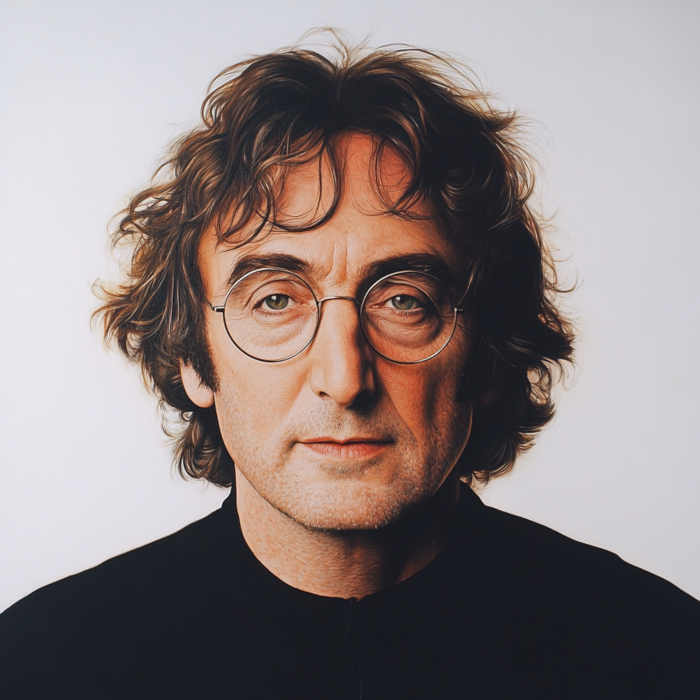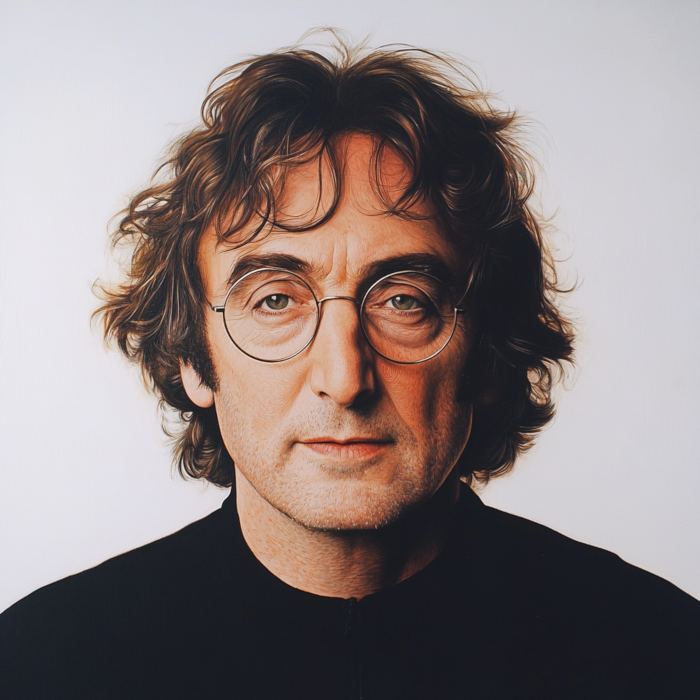


John Lennon (1940–1980) was a British musician, songwriter, and peace activist who gained worldwide fame as a founding member of the Beatles, one of the most influential bands in the history of popular music. Lennon was also known for his solo career and his outspoken views on peace, love, and social justice. His music, both with the Beatles and as a solo artist, continues to resonate with audiences around the world, making him one of the most iconic and enduring figures in 20th-century culture.
Birth and Family: John Winston Lennon was born on October 9, 1940, in Liverpool, England, during a German air raid in World War II. He was named after his paternal grandfather, John "Jack" Lennon, and Winston Churchill, who was then Prime Minister of the United Kingdom. Lennon's parents, Julia Stanley and Alfred Lennon, had a troubled relationship, and his father, a merchant seaman, was often away. When Lennon was five years old, his parents separated, and he was primarily raised by his maternal aunt, Mimi Smith, in the Liverpool suburb of Woolton.
Early Musical Influences: Lennon showed an early interest in music, influenced by his mother, Julia, who played the banjo and encouraged him to learn the guitar. As a teenager, he was drawn to the emerging rock and roll scene, inspired by artists like Elvis Presley, Buddy Holly, and Chuck Berry. Lennon formed his first band, the Quarrymen, in 1956, which later evolved into the Beatles.
Formation of the Beatles: In 1957, Lennon met Paul McCartney at a church fete, and the two quickly formed a close musical partnership. They were soon joined by George Harrison and, later, Ringo Starr, completing the lineup of what would become the Beatles. The band initially played in clubs in Liverpool and Hamburg, Germany, honing their skills and developing a distinctive sound.
Rise to Stardom: The Beatles' breakthrough came in 1963 with the release of their single "Please Please Me," followed by their debut album of the same name. The band's popularity skyrocketed, leading to what became known as "Beatlemania," a global phenomenon of fan hysteria. The Beatles revolutionized popular music with their innovative songwriting, harmonies, and studio techniques. Lennon's sharp wit and rebellious attitude made him a prominent figure within the group and a cultural icon in his own right.
Lennon-McCartney Songwriting Partnership: The songwriting partnership between John Lennon and Paul McCartney was one of the most successful and influential in the history of music. Together, they wrote some of the Beatles' most famous songs, including "A Hard Day's Night," "Help!," "Ticket to Ride," "In My Life," "Norwegian Wood," "Lucy in the Sky with Diamonds," "Strawberry Fields Forever," and "A Day in the Life." Lennon's lyrics often reflected his introspective, sardonic, and sometimes acerbic worldview, contrasting with McCartney's more melodic and optimistic style.
Later Beatles Years: As the Beatles' music evolved, so did Lennon's songwriting. He became increasingly interested in exploring deeper, more personal themes, often influenced by his experimentation with drugs and his relationship with Japanese avant-garde artist Yoko Ono, whom he married in 1969. Lennon's contributions to later Beatles albums, such as Sgt. Pepper's Lonely Hearts Club Band (1967), The White Album (1968), and Abbey Road (1969), showcased his growing maturity as an artist and his willingness to push the boundaries of popular music.
Breakup of the Beatles: The Beatles disbanded in 1970, amid growing tensions within the group and differing artistic directions. After the breakup, Lennon embarked on a solo career that allowed him to express his own musical and political ideas more freely. His first solo album, John Lennon/Plastic Ono Band (1970), was a stark, raw expression of his personal struggles and disillusionment, featuring songs like "Mother" and "Working Class Hero."
"Imagine" and Peace Activism: In 1971, Lennon released the album Imagine, which included the title track that would become one of his most enduring and iconic songs. "Imagine" encapsulated Lennon's vision of peace, love, and unity, calling for a world without borders, greed, or conflict. The song remains a powerful anthem for peace and is often associated with humanitarian causes.
Activism and Controversy: Throughout the 1970s, Lennon became increasingly involved in political activism, particularly against the Vietnam War. He and Yoko Ono staged several "bed-ins" for peace, using their fame to draw attention to anti-war causes. Lennon's outspoken views on politics, religion, and social justice often put him at odds with authorities, particularly in the United States, where he faced legal battles over his immigration status due to his anti-war activism and previous drug convictions.
"Give Peace a Chance" and "Happy Xmas (War Is Over)": Lennon continued to release music that reflected his activism and idealism, including the protest anthem "Give Peace a Chance" (1969) and the holiday classic "Happy Xmas (War Is Over)" (1971). These songs became emblematic of the peace movement and have been widely covered and celebrated in the decades since.
Temporary Retirement: In 1975, Lennon took a hiatus from music to focus on raising his son, Sean, who was born that year. During this period, he largely withdrew from public life, dedicating himself to being a father and homemaker.
Comeback and Final Album: In 1980, Lennon made a return to music with the release of the album Double Fantasy, a collaboration with Yoko Ono. The album featured the hit singles "(Just Like) Starting Over" and "Woman," and marked a creative resurgence for Lennon. However, just weeks after the album's release, tragedy struck.
Assassination: On December 8, 1980, John Lennon was shot and killed outside his apartment building, the Dakota, in New York City by Mark David Chapman, a mentally unstable fan. Lennon's murder shocked the world, and millions of fans mourned his death. His assassination was a profound loss to the music world and the broader cultural landscape.
Enduring Legacy: John Lennon's influence on music, culture, and activism remains profound. As a member of the Beatles, he helped redefine popular music and became a voice for a generation. His solo work, particularly songs like "Imagine," continues to inspire movements for peace and social justice. Lennon is remembered not only for his music but also for his commitment to using his platform to advocate for change.
Posthumous Recognition: Lennon has been posthumously honored with numerous awards and tributes, including induction into the Rock and Roll Hall of Fame (both as a member of the Beatles and as a solo artist). His legacy is also preserved through various memorials, such as the Strawberry Fields memorial in Central Park, New York City, and the Imagine Peace Tower in Iceland, created by Yoko Ono.
John Lennon was a towering figure in 20th-century music and culture, whose contributions to art, activism, and the quest for peace continue to resonate today. His journey from working-class Liverpool to global stardom with the Beatles, followed by his bold solo career and outspoken activism, made him a symbol of the transformative power of music and the enduring fight for a better world. Lennon's life, tragically cut short, left an indelible mark on history, and his music, message, and spirit continue to inspire generations around the globe.

We use cookies
We use cookies and other tracking technologies to improve your browsing experience on our website, to show you personalized content and targeted ads, to analyze our website traffic, and to understand where our visitors are coming from. Privacy Policy.